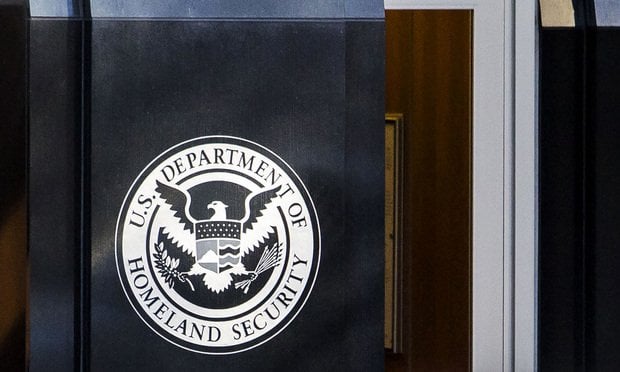In Setback to Trump Administration, Homeland Security Is Faulted by US Judge Over Denials of Protection to Young Immigrants
A Manhattan district court said Trump immigration officials were out of compliance with federal statutory language and New York state precedent in denying young immigrants special protection status without notice.
March 18, 2019 at 02:08 PM
3 minute read
 U.S. Department of Homeland Security building in Washington, D.C. Photo: Diego M. Radzinschi/ALM
U.S. Department of Homeland Security building in Washington, D.C. Photo: Diego M. Radzinschi/ALM
The U.S. Department of Homeland Security ran afoul of Administrative Procedure Act safeguards when it denied special status to several young immigrants in New York, U.S. District Judge John Koeltl of the Southern District of New York ruled.
Koeltl granted summary judgment to the class of plaintiffs, all of whom were determined by New York state family courts to have been abused or neglected by their parents, but were subsequently denied special immigration juvenile status by DHS's U.S. Citizenship and Immigration Services.
The plaintiffs claimed federal officials had adopted a new policy around the immigration policy, without alerting anyone to the changes. They claim under the previous SIJ application process, their petitions would have been granted.
In his decision, Koeltl said that, despite claims to the contrary, it was “plain” that officials are out of compliance with federal immigration law by not allowing the state courts to issue necessary finding for juvenile immigrants between 18 and 21 years of age, which would enable them to obtain protected immigration status.
“If the immigration laws are to be changed in that way, the change must come from Congress and not from the immigration authorities,” Koeltl stated.
According to the plaintiffs' attorneys with The Legal Aid Society and Latham & Watkins, the announced policy impacted thousands of younger immigrants across the country.
“This sweeping decision leaves no doubt that USCIS deliberately violated the rights of the most vulnerable, young immigrants—those who were abused, neglected, or abandoned by their parents,” said Legal Aid Society supervising attorney Beth Krause, with the organization's immigration law unit. “We are relieved that the federal courts have once again been willing to rein in the arbitrary and capricious policies of the Trump administration.”
Latham & Watkins partner Robert Malionek noted in a statement that the special immigration juvenile status program was created in 1990 to protect a particularly vulnerable group of young immigrants. The suit challenged federal immigration authorities' move to disqualify New York state family courts as “juvenile courts” for immigrants in the early adult age range, despite the language in the federal statute and prior readings of New York state law.
“Our class, made up of thousands of abused, abandoned, or neglected young immigrants, once again have a path to citizenship,” Malionek said.
Koeltl ordered the plaintiffs to submit a proposed judgment with declaratory and injunctive relief recommendations by March 22, with federal authorities to reply a week later.
A spokeswoman for USCIS said the department was evaluating the decision but couldn't comment on litigation directly.
In a separate statement, USCIS spokeswoman Jessica Collins remarked on the SIJ program in general, saying the department will continue “to ensure that children who have required the protection of a juvenile court … receive the humanitarian benefits they are eligible for.”
“The agency's highly trained and experienced officers evaluate each petition individually, on a case-by-case basis, to determine if it qualifies for SIJ status according to our nation's laws and policies,” Collins said.
Related:
Federal Suit Challenges Policy Shift in Protections for Young Immigrants
Asylum Application Processes and Co-Extensive Removal Processes
This content has been archived. It is available through our partners, LexisNexis® and Bloomberg Law.
To view this content, please continue to their sites.
Not a Lexis Subscriber?
Subscribe Now
Not a Bloomberg Law Subscriber?
Subscribe Now
NOT FOR REPRINT
© 2025 ALM Global, LLC, All Rights Reserved. Request academic re-use from www.copyright.com. All other uses, submit a request to [email protected]. For more information visit Asset & Logo Licensing.
You Might Like
View All
Five Years After Vega Much Remains Unsettled in Pay Frequency Litigation

Spotify GC Steps Down, Opts to 'Step Away From Full-Time Corporate Life'
2 minute read
Dechert Sues Former Attorney For Not Returning Compensation

Trending Stories
- 1X Faces Intense Scrutiny as EU Investigation Races to Conclusion & Looming Court Battle
- 2'Nation is in Trouble': NY Lawmakers Advance Bill to Set Parameters for Shielding Juror IDs in Criminal Matters
- 3Margolis Edelstein Broadens Leadership With New Co-Managing Partner
- 4Menendez Asks US Judge for Bond Pending Appeal of Criminal Conviction
- 5Onit Acquires Case and Matter Management Software Provider Legal Files Software
Who Got The Work
J. Brugh Lower of Gibbons has entered an appearance for industrial equipment supplier Devco Corporation in a pending trademark infringement lawsuit. The suit, accusing the defendant of selling knock-off Graco products, was filed Dec. 18 in New Jersey District Court by Rivkin Radler on behalf of Graco Inc. and Graco Minnesota. The case, assigned to U.S. District Judge Zahid N. Quraishi, is 3:24-cv-11294, Graco Inc. et al v. Devco Corporation.
Who Got The Work
Rebecca Maller-Stein and Kent A. Yalowitz of Arnold & Porter Kaye Scholer have entered their appearances for Hanaco Venture Capital and its executives, Lior Prosor and David Frankel, in a pending securities lawsuit. The action, filed on Dec. 24 in New York Southern District Court by Zell, Aron & Co. on behalf of Goldeneye Advisors, accuses the defendants of negligently and fraudulently managing the plaintiff's $1 million investment. The case, assigned to U.S. District Judge Vernon S. Broderick, is 1:24-cv-09918, Goldeneye Advisors, LLC v. Hanaco Venture Capital, Ltd. et al.
Who Got The Work
Attorneys from A&O Shearman has stepped in as defense counsel for Toronto-Dominion Bank and other defendants in a pending securities class action. The suit, filed Dec. 11 in New York Southern District Court by Bleichmar Fonti & Auld, accuses the defendants of concealing the bank's 'pervasive' deficiencies in regards to its compliance with the Bank Secrecy Act and the quality of its anti-money laundering controls. The case, assigned to U.S. District Judge Arun Subramanian, is 1:24-cv-09445, Gonzalez v. The Toronto-Dominion Bank et al.
Who Got The Work
Crown Castle International, a Pennsylvania company providing shared communications infrastructure, has turned to Luke D. Wolf of Gordon Rees Scully Mansukhani to fend off a pending breach-of-contract lawsuit. The court action, filed Nov. 25 in Michigan Eastern District Court by Hooper Hathaway PC on behalf of The Town Residences LLC, accuses Crown Castle of failing to transfer approximately $30,000 in utility payments from T-Mobile in breach of a roof-top lease and assignment agreement. The case, assigned to U.S. District Judge Susan K. Declercq, is 2:24-cv-13131, The Town Residences LLC v. T-Mobile US, Inc. et al.
Who Got The Work
Wilfred P. Coronato and Daniel M. Schwartz of McCarter & English have stepped in as defense counsel to Electrolux Home Products Inc. in a pending product liability lawsuit. The court action, filed Nov. 26 in New York Eastern District Court by Poulos Lopiccolo PC and Nagel Rice LLP on behalf of David Stern, alleges that the defendant's refrigerators’ drawers and shelving repeatedly break and fall apart within months after purchase. The case, assigned to U.S. District Judge Joan M. Azrack, is 2:24-cv-08204, Stern v. Electrolux Home Products, Inc.
Featured Firms
Law Offices of Gary Martin Hays & Associates, P.C.
(470) 294-1674
Law Offices of Mark E. Salomone
(857) 444-6468
Smith & Hassler
(713) 739-1250






